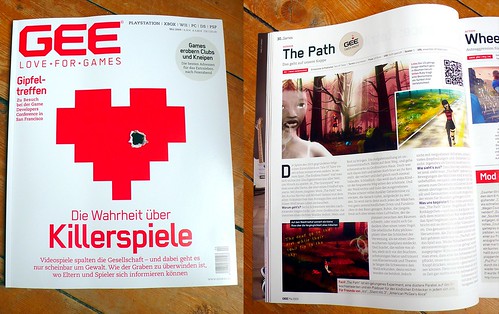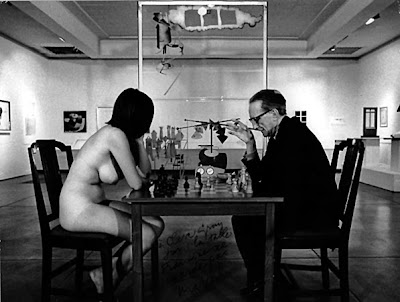Publilcations great and small gather to discuss the wonders of The Path, apparently the It Game of the game blogosphere (Slate).  It still amazes us that mainstream magazines like PC Format award The Path with Gold. That thing that is wrong with the games industry, well, it’s definitely not caused by the games press, who is meeting our little experiment with open arms.
It still amazes us that mainstream magazines like PC Format award The Path with Gold. That thing that is wrong with the games industry, well, it’s definitely not caused by the games press, who is meeting our little experiment with open arms.
The Path is also starting to get noticed in the more general press. Which makes us very happy because we really hope that it is a game that non-gamers will appreciate too.
The Path is thoroughly gynocentric in its design, character direction, music, etc. (…) You don’t have to be a female gamer, though, to appreciate The Path’s take on literary symbolism, Gothic sensibility, and relaxing pace of play.
Rebecca Wigandt on Gamer’s Intuition
The Path is a sort of anti-game in a way, a game turned inside out in service to something deeply personal, human and disturbing.
Mike “Scout” Gust on Tap-Repeatedly
The Path, in my opinion, transcended everything I’ve ever thought a computer game to be and instantly planted itself into my thought patterns.
fullmetal_ky on Niko’s face
What’s more, certain independent games are entering a phase – familiar to historians of jazz, comics and indeed 20th-century literature – of vigorous experimentation with techniques of narrative. (An evening with the frightening and baffling The Path, rather like an Angela Carter story siphoned through The Sims, will show you what I mean.)
Tim Martin in Telegraph
Telling a story through open interactive medium is not a simple task, but Tale of Tales pulls it off using atmosphere and implication. They also leave plenty for the reader’s imagination. Love or hate the experience, The Path is a marker in the evolution of storytelling.
DG Shrock on Writing for Torre
Man muss sich in jedem Fall auf The Path einlassen, muss in den Wald ganz eintauchen und den Alltag hinter sich lassen. Wem das gelingt, den erwartet ein ganz besonderes Erlebnis.
Noli_me_tangere on Resurrection: dead
The Path, in sostanza, è la Corazzata Potemkin del videogioco. Pretenzioso, soporifero, sconclusionato, per chiunque sia alla ricerca di un normale videogame. Elegante, ipnotico, onirico, per chiunque sia alla ricerca di un’esperienza audiovisiva.
Ivan Fulco in l’Unità
What I experienced was nothing short of breathtaking: entire worlds of narratives and areas to explore unrestrained by contrived and cliched gaming tasks (such as “defeat this monster, progress to the next level” etc).
Adrian Clement on Rollaroll
The animations are beautiful. The music can be chilling. The words and images grow increasingly disturbing, and sometimes sexual, though opaque. When it’s all over, there’s a lot to think about, which turns out to be a more enjoyable exercise than actually playing The Path.
Chris Suellentrop on Slate
I’m really torn on The Path. I don’t know what to do about it.
Akela Talamasca on Big Download
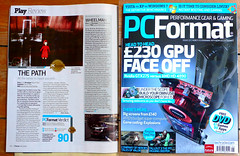
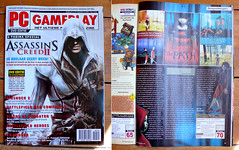
Many won’t enjoy it and some won’t understand, but this is an important step in the evolution of gaming. This sort of experimentation deserves recognition and reward and I only hope we’ll see more like it.
Dave James in PC Format 227 (June 2009)
The Path probeert je duidelijk te maken dat je je eigen levensweg moet bepalen en niet altijd naar anderen moet luisteren, zelfs al weet je dat het naar je eigen ondergang zal leiden. Zware kost dus, afwisselen met Braid is dan ook toegelaten.
Bart Van Heymbeeck in PG Gameplay 157 (May 2009)
There was also a 4 page review plus interview in the Ukrainian Gameplay magazine. Apparently, according to our esteemed colleague of Ice-Pick Lodge, they rated The Path the same as Killzone 2. 😀
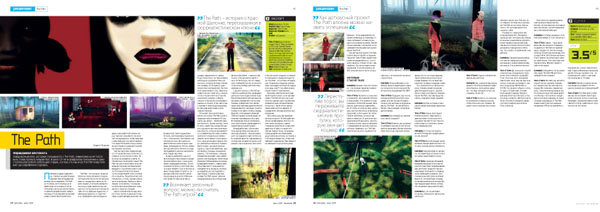
As an art house project The Path can be considered quite successful. The work of Tale of Tales is preserved thanks to the vagueness of the game’s genre. It’s difficult to review something that has nothing to be compared with. If you’re looking for a new experience, then consider your $10 well spent.
Kirill Tokarev in Gameplay
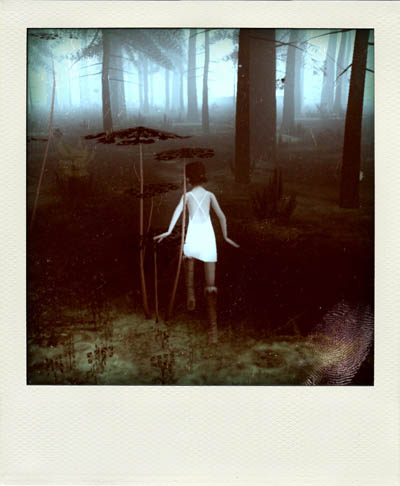
 It still amazes us that mainstream magazines like PC Format award The Path with Gold. That thing that is wrong with the games industry, well, it’s definitely not caused by the games press, who is meeting our little experiment with open arms.
It still amazes us that mainstream magazines like PC Format award The Path with Gold. That thing that is wrong with the games industry, well, it’s definitely not caused by the games press, who is meeting our little experiment with open arms.





